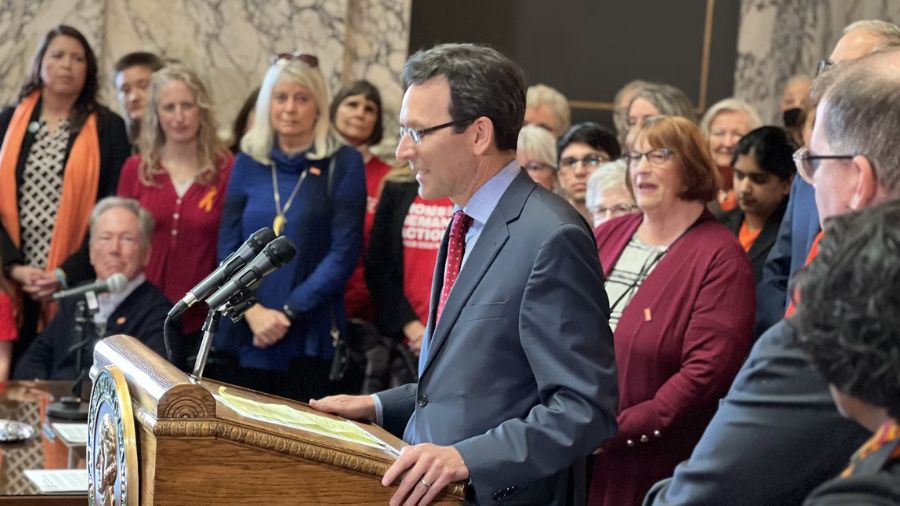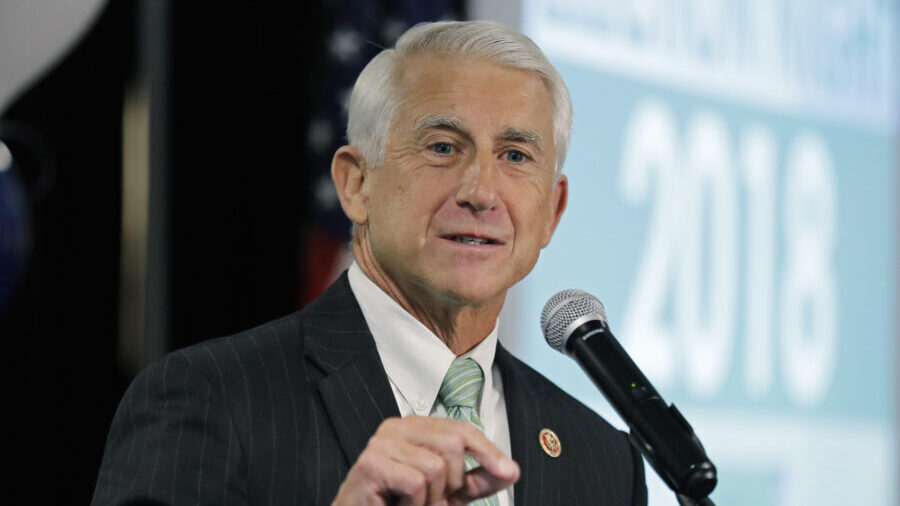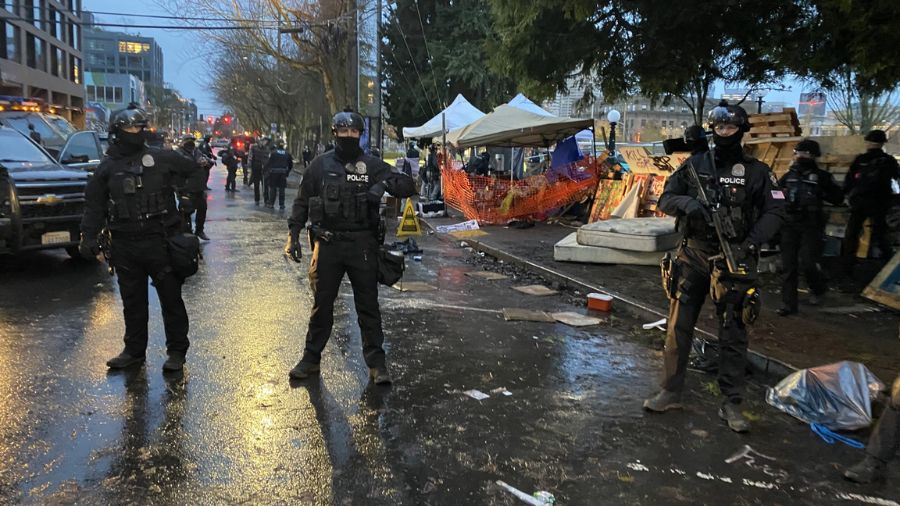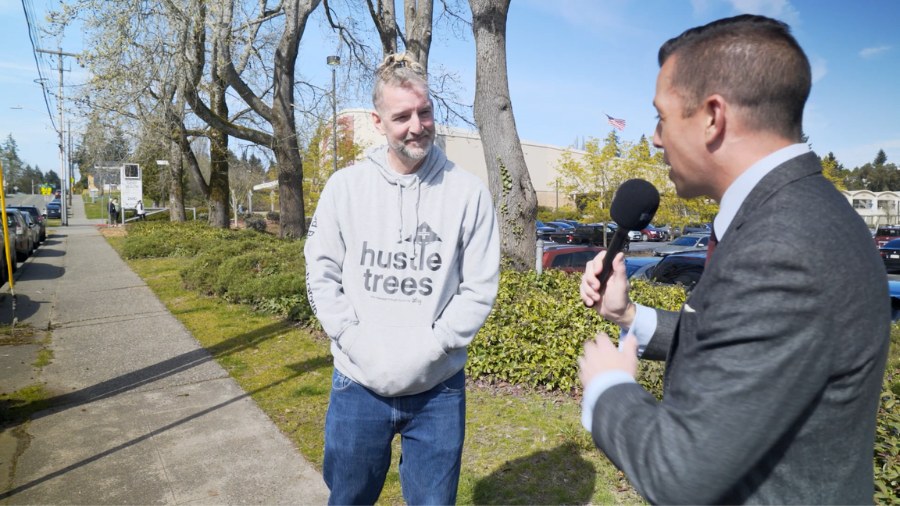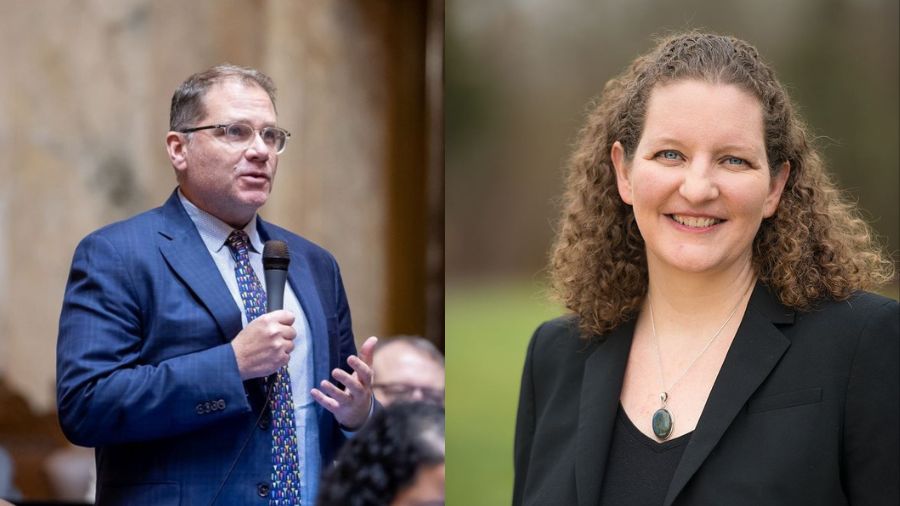Seattle Police, King County near major staffing, recruitment crisis
Aug 21, 2018, 5:35 AM | Updated: 11:41 am
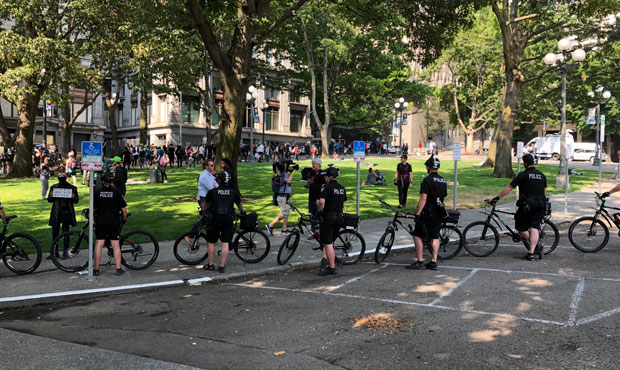
Seattle police officers line up before a rally last weekend. (Jason Rantz, KTTH)
(Jason Rantz, KTTH)
The Seattle Police Department and the King County Sheriff’s Office are near a major staffing and recruitment crisis, according to multiple police sources, as law enforcement agencies across the region struggle to recruit officers.
Morale at the SPD? At an all-time low, according to Seattle cops.
RELATED: SPD’s “mass exodus” of police officers
At the same time, the Washington State Criminal Justice Training Commission (CJTC) — which trains new recruits to become officers — cut the allotted seats to both the SPD and the KCSO.
The one thing that can help address a number of issues in Seattle is a contract, according to officers. At the county level, a shift towards entry-level recruitment is urgent and underway.
Academy seats are gone
The CJTC now only allots five seats per academy class to the Seattle Police Department — down from seven seats. That means at any given academy class, which occur once every three weeks, only five new recruits are trained to join the SPD. At that rate, new recruits may not keep up with retirements and transfers the SPD will experience this year. As of May, they lost 41 officers to attrition.
The SPD was told they were losing two training slots per session in the Basic Law Enforcement Academy (BLEA) on June 21, 2018. Thanks to a lack of “adequate funding from the Legislature to deliver enough BLEA classes to keep up with the volume of the new recruits…” statewide, CJTC Executive Director Sue Rahr had to revise the resources offered to the SPD.
SPD had been given seven slots to fill, but over the last two years, they’ve only used an average of five positions.
“With the extreme hardship it creates on other agencies that are now waiting up to six months to get a recruit into BLEA, I am proposing that we adjust the number of position [sic] held in each class for SPD to five,” Rahr wrote then SPD Interim Chief Carmen Best (she has since been appointed a permanent position as chief). “This will help relieve some of the pressure on our other stakeholders, and allow us to determine if five slots per class meets your needs.”
For the Seattle Police Officer’s Guild (SPOG), this news is distressing, though not shocking. They’ve long argued toxic city politics, an overzealous Office of Professional Accountability, and a lack of contract, have lead to a mass exodus of police officers from the SPD.
“This is not good news,” SPOG Vice President, Sergeant Rich O’Neil, explained to the Jason Rantz Show on KTTH. “We’re in this critical staffing shortage and we already know… the officers that are leaving and going to other departments. What this is now telling us, we’re not even getting the new recruits. This won’t even keep up with normal attrition, which is very alarming.”
SPD is not the only department facing this problem. The King County Sheriff’s Office also lost two seats at the academy — down from five.
“The reason behind that was because the last administration was focusing solely on hiring lateral officers from across the nation,” Sheriff Mitzi Johanknecht told me. “When [Sheriff John Urquhart] stopped intake of entry level hires locally and from surrounding states, it put us in a place where we weren’t using those [CJTC] slots in the Academy that we were given, like SPD. There are other agencies that have to wait and don’t get the options as often as we do. So the Academy… took us down from five to three.”
Neither departments would have lost these seats if they were consistently filling them.
While Sheriff Johanknecht is taking this data head on, hoping to increase those seats once demand increases, Seattle PD’s Jonah Spangenthal-Lee, a civilian employee, downplayed this move in an email, saying, in part “…the seat numbers were based on old, now-expired MOUs.” When pushed, Spangenthal-Lee said this has nothing to do with recruitment, writing, in part, “I already provided you with information regarding the seat count, which, while counter to your narrative, is the info I’ve been able to gather up to this point.”
The staffing crisis nears (or is already here)
Is the low staffing for both the KCSO and SPD an issue that demands immediate intervention?
“I wouldn’t describe it that way now, but in a few short months, it will be a crisis, because of how these things are staggered,” Sheriff Johanknecht explained. “It takes a few months before you can get someone new into place without them needing training.”
Sheriff Johanknecht expects a staggering 60 vacancies by the end of the year, but, in a worst-case scenario, it could hit 80.
“Normally, we run 15-20 [vacancies a year],” she offered. “We’re at 27 right now. It’s a pretty big number in the next few months too. I’m not panicked as much as trying to focus on gaining ground … looking for lateral deputies and doing really good recruiting.”
When it comes to the SPD, you get different answers when asking if they are properly staffed. The SPD position has been that they have enough cops, but are always looking to add more recruits.
“I don’t know I’d say we have a staffing problem, [than] we do staffing challenges,” SPD’s Human Resources Director Mike Fields previously told me. “Attrition is stable and we can hire somewhat in advance of attrition … from my perspective, my goal is to hire as many quality diverse applicants as we can.”
But if you ask police officers themselves, they paint a dramatically different picture and say the department is at crisis-levels. I’ve granted all officers quoted in this article anonymity, unless otherwise noted, because they fear retribution for speaking out and have not been authorized to talk to the media.
“This mass exodus is epic,” one SPD officer explained to me. “An officer with 35-plus years has told us that he has never seen anything like this. I know of at least five people on my watch in background processes with other agencies. We continue to hemorrhage officers to other agencies and the city doesn’t appear to care.”
On July 12, 2018, I submitted a public disclosure request to get the specific details on separations — the term used to describe officers leaving the department. But the SPD has not yet fulfilled my request because they are “…experiencing a temporary reduction in staff available to process public records requests.”
“[SPD] is in total denial of the ongoing staffing issues,” the officer told me. “Seattle Police used to be the place everybody tested for and wanted to work for … It was an honor to work here. I was one of the very few that made it and was hired. Fast forward a few years and those tables have turned. Now Seattle is a butt of most jokes.”
The city has pushed back at these claims in the past. Seattle Mayor Jenny Durkan’s office argues there is no mass exodus because the SPD had hired three more officers (+44) than have left through May 2018 (-41). I’ve previously explained why their argument is baffling.
I’ve also personally confirmed with a number of officers already in the process of lateral moves, and others that will soon be. In fact, we know where some of them are going.
“We just had a lateral from Seattle last month,” offered Officer Seth Tyler of the Bellevue Police Department. “He is having conversations with other officers from Seattle. He loves it here in Bellevue. He appreciates the culture and community support in Bellevue. We’re hoping he brings a few friends.”
They’re also going to the KCSO.
“I know there are a couple of people coming over from the SPD,” Sheriff Johanknecht revealed.
Still, the SPD downplays the staffing concerns. And one SPD officer thinks there’s a reason the department won’t directly address them.
“If SPD were to admit there is a staffing problem they would then have to address why,” the officer explained.
Why Seattle cops are leaving
Every officer I talked to cites the exact same three issues leading to what many officers call “record-low morale” in the SPD: toxic city politics; an aggressive Office of Professional Accountability; and working without a union contract.
A second officer I spoke to for this story tells me he is disgusted with the Seattle City Council’s lack of support.
“I’m a cop. I don’t have to be, but I am and I love my work,” the officer told me. “More than that I’m a Seattle cop. I don’t have to be, but I love my community and there is nowhere else I would rather serve … I was recently asked why morale in the department seems low and recruitment efforts have done little to grow the force.”
The officer offered some answers, calling out the council for killing the North Precinct project or criticizing their work on May Day. His ire is focused on Councilmember Kshama Sawant, who he believes has vilified cops over the years.
“Remember the time Seattle officers saved their own lives when a convicted rapist and drug dealer pulled a gun on them?” the officer rhetorically asks. “I can’t remember, what did the city council say? Oh yeah, that the cops were racist murderers.”
It’s a problem some other departments aren’t facing. In fact, things are much different with the Bellevue PD and the Bothell PD.
“Our officers recognize we’re fortunate to have the support of the community, the council and the mayor,” Bellevue PD Officer Tyler explained. “It’s not a slight [towards Seattle]. We’ve just enjoyed that support. It’s not by accident. It’s by us continuing to do community outreach … community advisory council … we’ve done a lot and we’re one of the first agencies to implement the community policing models.”
In Bothell, Captain Mike Johnson has similar experiences to Bellevue.
“There’s a lot of support for law enforcement,” Captain Johnson recently explained on the Jason Rantz Show. “We’re kinda lucky being out in Bothell. There’s not a lot of anti-police sentiment in that area. We feel supported all the time.”
Perhaps the community support is why Bothell is attracting so many recruits, when other departments are struggling in Washington. The Bothell PD normally average between 10 and 15 applicants a month. But now, after stepping up recruitment efforts by explaining what the community and department have to offer, they’re seeing up to 50 applicants a month. The applicants “…said we seemed like we cared about the applicants and felt that was one of the deciding factors for applying,” according to Captain Johnson.
Seattle officers don’t feel this kind of support. It’s made worse by the Office of Professional Accountability (OPA), they argue. Every officer I’ve spoken to has explained their disgust with the OPA for investigating them on minor issues, such as filling out an incorrect form or failing to turn on their body cameras the second they’re supposed to. It’s a complaint SPOG VP O’Neil hears frequently.
“You listen to exit reports, and you hear it’s the overzealous OPA, not really knowing what they can and can’t do because it seems like honest mistakes are looked at as misconduct,” he said.
Officers were outraged when the OPA recommended punishment against Officer Nick Guzley who, safely and successfully, subdued an ax-wielding man in South Lake Union. Then-Interim Chief Carmen Best overturned the OPA finding.
But the one issue being discussed more and more, with renewed urgency, is a new contract.
Show me the contract
The city and SPOG have inched closer and closer to a long overdue contract and, according to some officers, that will help recruitment.
One officer complained to me: “Our pay is low, other agencies are paying more, so why put up with all the City of Seattle asks of its officers when you can go to another agency nearby and not be second-guessed for every single thing that is done and not supported in the slightest by their department.”
Another officer said: “SPD officers have been going to work every day for almost four years with no contact. None. Like not even close. During the last four years, wages have plummeted in comparison to agencies nearby, wages that for a long time were the only reasonable way to lure officers into the city. Yet there has been no slow-down, no “sick out” or strike. We are still at work. Every day.”
This is why SPOG Vice President O’Neill has been working so hard to secure a new contract for his officers. He sees this as crucial to stopping the “mass exodus” and boosting recruitment numbers.
The issue isn’t about more money, per se; officers are currently leaving (or about to) and are not citing pay as a major reason, though it is a contributing factor for some. It’s giving some officers, already sick of how they’re being treated by the city council, an easy reason to make a lateral move.
“I think people are saying ‘wait a minute, why would I go to Seattle with this constant barrage of negativity from elected officials, from community members and the fact that as we speak, we’re three and a half years without a contract,” Sergeant O’Neill told me. “We can’t keep hanging on like this. For those people, trying to decide if they’ll leave or not, this will be a lot to show that Seattle finally came through.”
The SPD, through Spangenthal-Lee, would not say if a contract would help make recruitment easier because he hadn’t seen recruitment data when asked.
The recruitment problem
You can’t have a staffing crisis without a recruitment problem, and there appears to be one, according to multiple Seattle officers who work a variety of posts at the department. The SPD, for their part, has not yet been able to provide data for us to determine if the numbers back up the recruitment concerns. After a week, the SPD could not provide the statistics because, according to Spangenthal-Lee, Human Resources doesn’t readily have the data in the format requested. Once it’s provided, we will update the story.
If the SPD is not having issues, they appear to be a lucky rarity. Nearly every other department I spoke to for this piece is struggling to recruit officers, even if they’re perceived as great places to work. And nationally? It’s a growing concern as millennials aren’t eager to jump into police work.
“The number of applicants [here] are going down and the number of vacancies are going up,” Officer Tyler of Bellevue Police Department explained. “…a new contract would help.”
Like Seattle, the Bellevue PD is operating without a contract for its officers.
The Marysville Police Department has seen a dramatic downward trend in applicants for their current 11 openings. In 2017, the MPD saw 300 applicants to become police officers, but so far this year they’ve only received 185 applicants, though they have been able to hire new officers recently.
And after years of focusing on laterals, instead of new recruits, the KCSO has been refocused on bringing in new bodies. It’s happening at the right time because applications from lateral officers have been slowing.
“We are getting interested lateral officers, but that’s slowed down a bit,” Sheriff Johanknecht cautioned. “It seems to me that there isn’t the amount of people moving now. I don’t know if it’s a summer drought due to people’s lives. But what we’re doing now is ramping up how we recruit people.”
Both the KCSO and the Bellevue PD will be using a full-time recruiter to make this process more effective. In Marysville, Commander Mark Thomas tells me they’re pushing forward with a more aggressive recruitment strategy, including “having our lateral officers reach back to their home agency and talk about the opportunities we provide.” Laterals make up a slim majority of their current officers.
And, unlike in Seattle, officers seem to have less gripes about working with these departments.
“Why do we have a problem recruiting in the Seattle Police Department? Do a quick search,” said one Seattle officer. “If you were going to get a new job would you do a quick search on companies or their competitors in the sector? Would you look at recent articles? Maybe try to find someone who works there to tell you about it?”



